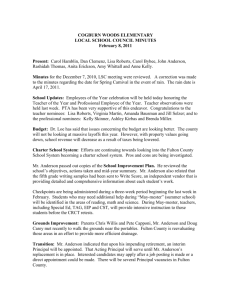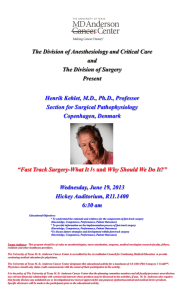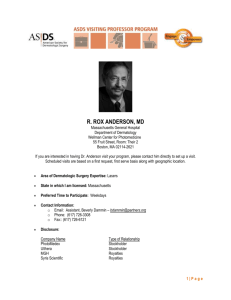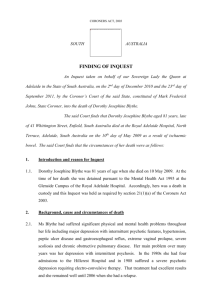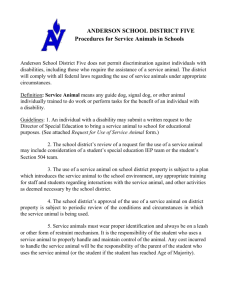ANDERSON Joel Kenneth - Courts Administration Authority
advertisement
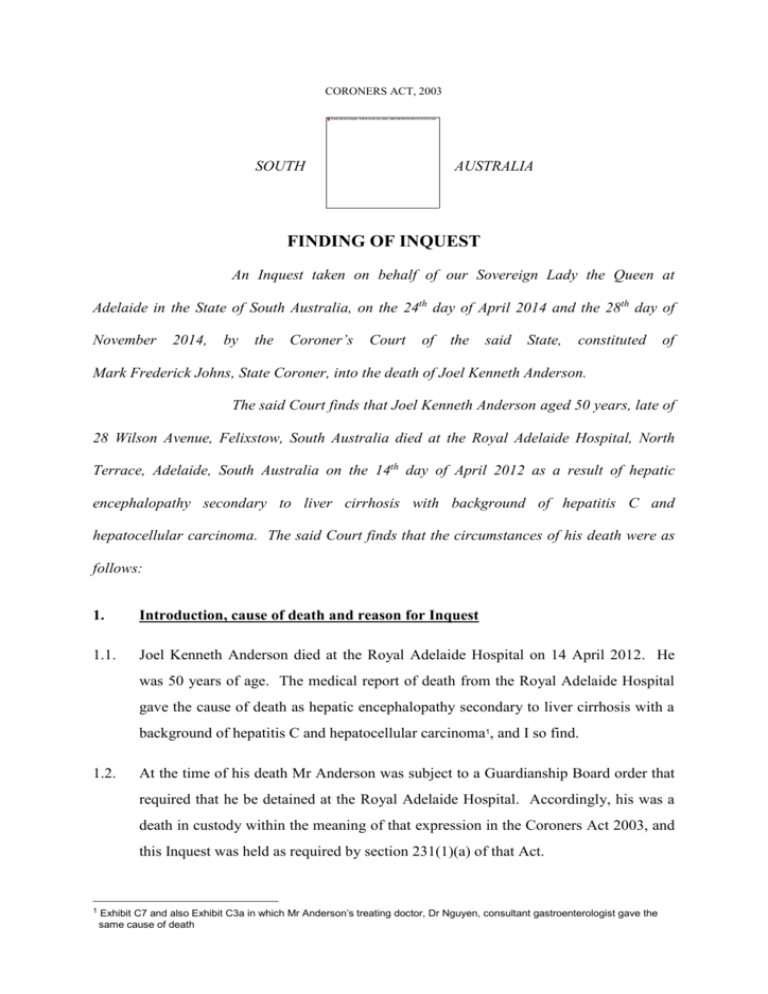
CORONERS ACT, 2003 SOUTH AUSTRALIA FINDING OF INQUEST An Inquest taken on behalf of our Sovereign Lady the Queen at Adelaide in the State of South Australia, on the 24th day of April 2014 and the 28th day of November 2014, by the Coroner’s Court of the said State, constituted of Mark Frederick Johns, State Coroner, into the death of Joel Kenneth Anderson. The said Court finds that Joel Kenneth Anderson aged 50 years, late of 28 Wilson Avenue, Felixstow, South Australia died at the Royal Adelaide Hospital, North Terrace, Adelaide, South Australia on the 14th day of April 2012 as a result of hepatic encephalopathy secondary to liver cirrhosis with background of hepatitis C and hepatocellular carcinoma. The said Court finds that the circumstances of his death were as follows: 1. Introduction, cause of death and reason for Inquest 1.1. Joel Kenneth Anderson died at the Royal Adelaide Hospital on 14 April 2012. He was 50 years of age. The medical report of death from the Royal Adelaide Hospital gave the cause of death as hepatic encephalopathy secondary to liver cirrhosis with a background of hepatitis C and hepatocellular carcinoma1, and I so find. 1.2. At the time of his death Mr Anderson was subject to a Guardianship Board order that required that he be detained at the Royal Adelaide Hospital. Accordingly, his was a death in custody within the meaning of that expression in the Coroners Act 2003, and this Inquest was held as required by section 231(1)(a) of that Act. 1 Exhibit C7 and also Exhibit C3a in which Mr Anderson’s treating doctor, Dr Nguyen, consultant gastroenterologist gave the same cause of death 2 2. Background 2.1. Mr Anderson was born with the name Noel Barry McLean which he changed in 1999 to Joel Kenneth Anderson. Mr Anderson suffered with hepatitis C for about 30 years. Due to his use of illicit substances he commenced methadone treatment in 2000 and this continued until his final admission to the Royal Adelaide Hospital in 2012. His general practitioner was Dr Forsyth who reported that most of his medical problems related to alcohol abuse. He also suffered from depression for which he was prescribed Dothiepin. 2.2. On 7 February 2012 Mr Anderson consulted Dr Forsyth. On examination he had a severely swollen stomach and was retaining fluid. Dr Forsyth prescribed him Spironolactone to assist with his fluid retention. She also told him to go directly to the Emergency Department at the Royal Adelaide Hospital. Mr Anderson did not follow that advice. He returned to Dr Forsyth on 13 February 2012 and complained of being in a lot of pain. he was immediately conveyed by taxi to the Royal Adelaide Hospital where he was noted to be suffering from ascites as a result of his end-stage liver disease. Further investigation revealed that he was suffering from liver cancer and advanced liver failure. His abdomen was drained to remove the excess fluid and a picc line was inserted for administration of medication. Because of his intravenous drug use his peripheral veins were unsuitable for conventional intravenous cannulation and this was the reason for insertion of a picc line. 2.3. Mr Anderson suffered encephalopathy due to his liver failure which resulted in confusion and delirium. He suffered from peritonitis during his stay in hospital and had to be treated with antibiotics. He recovered well after two weeks of that treatment. On 24 February 2012 an endoscopy revealed four varices, confirming advanced liver cirrhosis. A liver cancer multi-disciplinary meeting was held to discuss Mr Anderson's future treatment. It was decided that he was not suitable for a liver transplant due to the high levels of tumour marking in conjunction with a visible clot in his liver vein and the untreated hepatitis C infection. He was advised about his poor prognosis and he requested that if his condition deteriorated he did not wish to be resuscitated. 3 2.4. During his admission Mr Anderson was not compliant with medical direction, particularly with regard to medication. He also threatened staff members on occasions with the need for code blacks to be called. 2.5. On 5 March 2012 Mr Anderson absconded from the hospital. He was returned about half an hour later by ambulance having been located on the road where he had suffered a fall. He had consumed alcohol during his absence and had fallen and hit his head. A CT scan was ordered and this excluded a skull fracture or intracranial bleed. 2.6. The following day he was psychiatrically assessed as being depressed and confused. He was considered a risk to himself and others and was detained under the Mental Health Act 2009. The following day a code black was called as he had attempted to abscond from the hospital again. He was exhibiting signs of paranoia and was returned to the ward and treated with Olanzapine. 2.7. The following day a code black was called when Mr Anderson was found drinking Aqium which is a hand sanitiser gel. He was verbally aggressive towards staff and began to damage hospital property. This resulted in him being restrained to his bed with shackles. On 13 March 2012 Mr Anderson again absconded from the ward and a missing person's report was made to police. However, after some 7 hours Mr Anderson voluntarily returned to the ward. Mr Anderson’s physical and cognitive state continued to rapidly decline and it was decided that he should be under the care of the Guardianship Board. On 14 March 2012 his social worker wrote to the Board requesting that they appoint a legal guardian. A hearing was conducted on 3 April 2012 and an order was made pursuant to section 32 requiring that Mr Anderson be detained for treatment at the Royal Adelaide Hospital until further order. 2.8. On 13 April 2012 Mr Anderson became increasingly drowsy and encephalopathic. He was provided with comfort care and died at 2:30pm the following day. 4 3. Conclusion and recommendation 3.1. In my opinion the treatment afforded to Mr Anderson during his period in detention was entirely appropriate in all the circumstances. Furthermore, his detention was lawful and appropriate. I have no recommendations to make in this matter. Key Words: Death in Custody; Natural Causes In witness whereof the said Coroner has hereunto set and subscribed his hand and Seal the 28th day of November, 2014. State Coroner Inquest Number 8/2014 (0602/2012)

